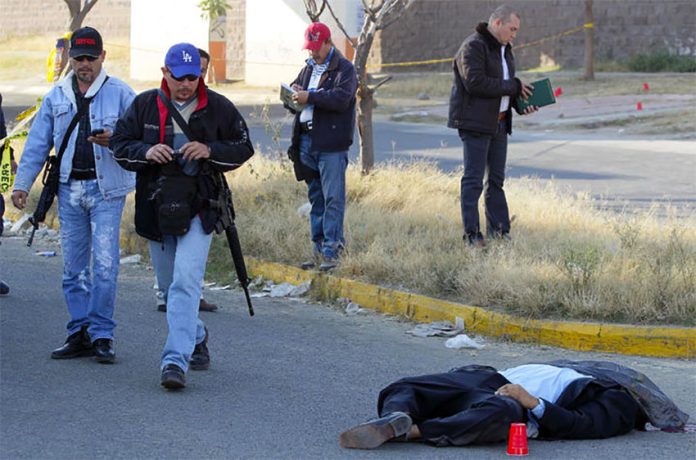The 0.4% decline in homicides in 2020 is not the result of any federal government action or policy, according to an independent crime watch group.
The government reported Wednesday that there were 34,515 homicides last year, a reduction of 133 compared to 2019, which was the most violent year on record.
President López Obrador acknowledged that his administration still has a lot to do to improve security but asserted that it has made “significant progress” in the fight against crime.
Presenting a crime report on Thursday, the director of the National Citizens Observatory (ONC) said it’s difficult to say that the slight decline in homicides “is a success derived from an action or public policy of federal authorities.”
The federal government increased the size of the National Guard in 2020, maintained social programs designed to address the root causes of violence and published a decree ordering the armed forces to continue carrying out public security tasks for another four years but according to Francisco Rivas, there is no “specific public policy” to which the “minimal decrease” in violence can be attributed.
Rather, the 0.4% decline in homicides was a consequence of a reduction in people’s mobility due to the coronavirus pandemic, the ONC chief said.
“There is evidence to affirm that the slight decrease in homicides is due to the lockdown [measures],” he said.
There was no successful public policy to reduce violence and 2020 was a “disappointing year” in terms of security, Rivas added.
“In 2020, homicidal violence was maintained at a historical high. … This scenario is a result of the lack of coherence in the policies with which [the government] is aiming to pacify the country,” he said.
“… Mexico has not been pacified but rather militarized,” Rivas added, referring to the government’s continued use of the armed forces for public security tasks even though López Obrador pledged before he took office to withdraw the military from the streets.
He also noted that the current government has assigned more non-military tasks to the armed forces, including the construction of infrastructure projects such as the new Mexico City airport and the management of customs and ports.
“The exoneration of the former defense minister, General [Salvador] Cienfuegos, is a clear sign of the power of the armed forces and the contempt of the federal government for justice,” Rivas claimed, referring to the rapid investigation that cleared the ex-army chief of drug trafficking and money laundering charges.
Although the government hailed the slight reduction in murders last year, the fact remains that 2020 was the second most violent year on record.
Writing in the newspaper El Universal, security analyst Alejandro Hope acknowledged that it was preferable to have fewer murder victims than more but emphasized the minute size of last year’s reduction in violence.
“A reduction of 132 murders in a year is equivalent to one less murder every three days (approximately),” Hope wrote. “In a country in which we have a murder every 15 minutes, that’s not much change.”
The fact remains that about 3,000 people are murdered every month, Hope said, noting that there has been minimal change to Mexico’s homicide numbers during the past three years.
“[What are] the causes of this tragic stability? We don’t know. Or at least not all of them,” he wrote.
“If one gets close with a magnifying glass at a local level it’s perhaps possible to find dynamics that can explain some slight changes in [violence] trends. If one goes up to the stratosphere some structural causes – like impunity and economic inequality – might appear on the radar. But all in all nobody really has a good theory to explain our long homicidal plateau,” Hope continued.
“If the causes of the phenomenon are opaque, its consequences are clear. One of them at least: we’ve normalized having high levels of homicidal violence. The monthly reports of the National Public Security System and [the statistics agency] Inegi are no longer news anywhere. It’s not a cause for media attention nor public debate that 3,000 human beings are murdered every month.”
The analyst said that there is “organizational density” and “political action” against Mexico’s femicide problem but charged that no one is raising their voice to demand an effective response to the homicide problem and an end to “silence and impunity.”
“Both society and the political class have decided that while there are no abrupt increases [in homicide numbers] or spectacular massacres they can tolerate extremely high levels of lethal violence,” Hope wrote.
“I’m afraid that this won’t change soon and that what we have seen in these three years will continue for the foreseeable future: 3,000 people murdered each month without anyone raising an eyebrow.”
Source: Reforma (sp), El Universal (sp)
